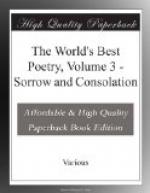An’ I could never speak to suit her, never could
please her eye,
An’ it made me independent, an’ then I
didn’t try;
But I was terribly staggered, an’ felt it like
a blow,
When Charley turned ag’in me, an’ told
me I could go.
I went to live with Susan, but Susan’s house
was small,
And she was always a-hintin’ how snug it was
for us all;
And what with her husband’s sisters, and what
with child’rn three,
’Twas easy to discover that there wasn’t
room for me.
An’ then I went to Thomas, the oldest son I’ve
got,
For Thomas’s buildings’d cover the half
of an acre lot;
But all the child’rn was on me—I
couldn’t stand their sauce—
And Thomas said I needn’t think I was comin’
there to boss.
An’ then I wrote to Rebecca, my girl who lives
out West,
And to Isaac, not far from her—some twenty
miles at best;
And one of ’em said ’twas too warm there
for any one so old,
And t’ other had an opinion the climate was
too cold.
So they have shirked and slighted me, an’ shifted
me about—
So they have well-nigh soured me, an’ wore my
old heart out;
But still I’ve borne up pretty well, an’
wasn’t much put down,
Till Charley went to the poor-master, an’ put
me on the town.
Over the hill to the poor-house—my child’rn
dear, good by!
Many a night I’ve watched you when only God
was nigh;
And God’ll judge between us; but I will al’ays
pray
That you shall never suffer the half I do to-day.
WILL CARLETON.
OLD.
By the wayside, on a mossy stone,
Sat a hoary pilgrim, sadly musing;
Oft I marked him sitting there alone.
All the landscape, like a page perusing;
Poor, unknown,
By the wayside, on a mossy stone.
Buckled knee and shoe, and broad-brimmed hat;
Coat as ancient as the form ’twas
folding;
Silver buttons, queue, and crimped cravat;
Oaken staff his feeble hand upholding;
There he sat!
Buckled knee and shoe, and broad-brimmed hat.
Seemed it pitiful he should sit there,
No one sympathizing, no one heeding,
None to love him for his thin gray hair,
And the furrows all so mutely pleading
Age and care:
Seemed it pitiful he should sit there.
It was summer, and we went to school,
Dapper country lads and little maidens;
Taught the motto of the “Dunce’s Stool,”—
Its grave import still my fancy ladens,—
“Here’s a fool!”
It was summer, and we went to school.
When the stranger seemed to mark our play,
Some of us were joyous, some sad-hearted,
I remember well, too well, that day!
Oftentimes the tears unbidden started,
Would not stay
When the stranger seemed to mark our play.
One sweet spirit broke the silent spell,
O, to me her name was always Heaven!
She besought him all his grief to tell,
(I was then thirteen, and she eleven,)
Isabel!
One sweet spirit broke the silent spell.




